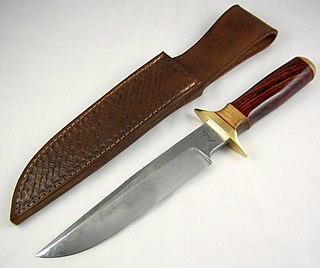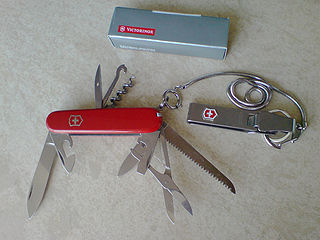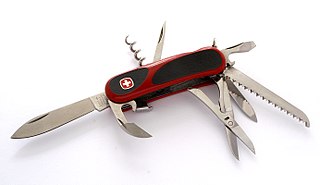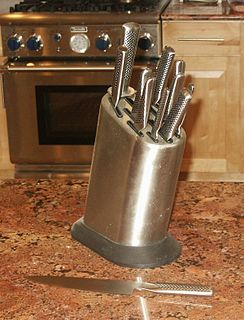
A knife is a tool or weapon with a cutting edge or blade, often attached to a handle or hilt. One of the earliest tools used by humanity, knives appeared at least 2.5 million years ago, as evidenced by the Oldowan tools. Originally made of wood, bone, and stone, over the centuries, in step with improvements in both metallurgy and manufacturing, knife blades have been made from copper, bronze, iron, steel, ceramic, and titanium. Most modern knives have either fixed or folding blades; blade patterns and styles vary by maker and country of origin.

The Swiss Army knife is a multi-tool pocketknife manufactured by Victorinox. The term "Swiss Army knife" was coined by American soldiers after World War II after they had trouble pronouncing the German word "Offiziersmesser", meaning "officer’s knife".

A Japanese kitchen knife is a type of a knife used for food preparation. These knives come in many different varieties and are often made using traditional Japanese blacksmithing techniques. They can be made from stainless steel, or hagane, which is the same kind of steel used to make Japanese swords. Most knives are referred to as hōchō or the variation -bōchō in compound words but can have other names including -kiri. There are four general categories used to distinguish the Japanese knife designs: handle, blade grind, steel, and construction.

A switchblade is a type of knife with a sliding blade contained in the handle which is extended automatically by a spring when a button, lever, or switch on the handle or bolster is activated. Most switchblade designs incorporate a locking blade, in which the blade is locked against closure when the blade is extended to the fully opened position. It is unlocked by a mechanism that allows the blade to be folded and locked in the closed position.

Victorinox is a knife manufacturer and luxury watchmaker based in the town of Ibach, in the Canton of Schwyz, Switzerland. It is well known for its Swiss Army knives. The Swiss Army knives made by Victorinox are made of a proprietary blend steel from Germany and France. Since its acquisition of rival Wenger in 2005, it has become the sole supplier of multi-purpose knives to the Swiss army. It is the biggest manufacturer of pocket knives in the world; in addition, the company licenses its logo for watches, apparel, and travel gear.

Wenger was one of two companies that have manufactured Swiss Army knives. Based in Delémont, Wenger was acquired by rival Victorinox in 2005. Since 2013, Wenger Swiss Army knives are integrated in the Victorinox collection ; the brand Wenger remains for watches and licensed products.

The Benchmade Knife Company is an American knife manufacturer in Oregon City, Oregon. Its products are sold to numerous markets, such as everyday carry, outdoor sporting, cutlery, rescue, law-enforcement, martial-arts, and military. The company has collaborated with a number of custom knife makers since its inception.
The Laguiole knife is originally a high-quality traditional Occitan pocket-knife, originally produced in the "knife-city" of Thiers where 70% of the French cutting tool production comes from, and in the small village of Laguiole, both located in the Massif central region of France. Laguiole in this instance does not refer to the French knife brand, but to a generic term that has become associated with a specific shape of a traditional knife common to this area.

The Camillus Cutlery Company was one of the oldest knife manufacturers in the United States as its roots date back to 1876. The Company produced millions of knives until it filed for bankruptcy in 2007. Its brand name and intellectual property rights were purchased by Acme United Corporation, which re-launched the Camillus brand in May 2009 using modern materials.
Wüsthof is a knife-maker based in Solingen, Germany. Family owned for seven generations, the company's main products are mid-priced to high-end kitchen knives for domestic and professional use. Wüsthof is one of the leading manufacturers of chef's knives.
Spyderco is an American cutlery company based in Golden, Colorado, producing knives and knife sharpeners. Spyderco pioneered many features that are now common in folding knives, including the pocket clip, serrations, and the opening hole. Spyderco has collaborated with 30 custom knife makers, athletes, and self-defense instructors for designs and innovated the usage of 20 different blade materials.
Sabatier is the maker's mark used by several kitchen knife manufacturers—by itself it is not a registered brand name. The name Sabatier is considered to imply a high-quality knife produced by one of a number of manufacturers in the Thiers region of France using a full forging process; the knives of some of these manufacturers are highly regarded. However, the name "Sabatier" came into use before intellectual property laws and is not protected; knives legally bearing the name range from high-quality knives made in France to cheap mass-produced products of poor quality from France and other countries; a registered logo or full name, or both, such as "65 Sabatier Perrier", is necessary to establish origin and quality.

Ontario Knife Company, also known as OKC, is an American manufacturer of knives and other edged tools.

GLOBAL is a Japanese brand of kitchen knives and accessory tools owned and manufactured by the Yoshikin factory of Japan. The Yoshikin Factory is owned by the Watanabe family and located in Tsubame, Japan.
Kershaw Knives designs, sources and manufactures a wide range of knives, including pocketknives, sporting knives, and kitchen cutlery. Kershaw is a brand of Kai USA Ltd., a member of the KAI Group, headquartered in Tualatin, Oregon, United States.

Ken Onion is an American custom knifemaker based in Kaneohe, Hawaii, United States who invented the "SpeedSafe" assisted opening mechanism for Kershaw Knives. Ken Onion was the Premier Knife Designer for Kershaw Knives.
Friedr. DICK is a German cutlery manufacturer founded 1778 in Esslingen, Germany. Known by their logo name of F. Dick, the company has three lines of business. F. Dick specializes primarily in butcher's knives and tools, where it is regarded as a market leader in both Europe and North America. The company is known for its wide range of high quality sharpening steels and is also renowned for its chef's knives where it is a respected manufacturer in the professional sector, but less established for the casual user. Although F. Dick cutlery is available for purchase in the American market, the brand has not caught-on with mainstream American consumers. As a result, the brand is limited in its availability, and is generally only available at cutlery specialty-stores in the American market.
Imperial Schrade Corp. was an American knife manufacturer of hunting knives, pocketknives, utility knives, and bayonets during the 20th and early 21st centuries. The consolidation of five forerunner companies, including its namesakes, the Imperial Knife Company, founded 1916, and the Schrade Cutlery Company, founded in 1904, Imperial Schrade manufactured its products in the United States and Ireland and sold through hardware stores, department stores, and on military bases. The original company's fortunes declined and in 2004 it entered into bankruptcy where all equipment and intellectual property was sold off to reimburse creditors. The name and intellectual property was bought by Taylor Brands and used for marketing purposes.

Taylor's Eye Witness Works is an industrial building on Milton Street in the Devonshire Quarter area of Sheffield city centre, South Yorkshire, England. The works are a Grade II listed building which since their foundation in 1852 have always specialised in producing kitchen and pocket knives along with various associated products. The building is believed to be the only traditional works in Sheffield which still manufactures its original products. It stands next to the Beehive Works another listed cutlery works on Milton Street.

Ka-Bar is the contemporary popular name for the combat knife first adopted by the United States Marine Corps in November 1942 as the 1219C2 combat knife, and subsequently adopted by the United States Navy as the U.S. Navy utility knife, Mark 2. Ka-Bar is the name of a related knife manufacturing company, Ka-Bar Knives., Inc., of Olean, New York, a subsidiary of the Cutco Corporation.













